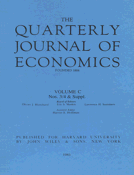-
Views
-
Cite
Cite
Kenneth Rogoff, The Optimal Degree of Commitment to an Intermediate Monetary Target, The Quarterly Journal of Economics, Volume 100, Issue 4, November 1985, Pages 1169–1189, https://doi.org/10.2307/1885679
Close - Share Icon Share
Abstract
Society can sometimes make itself better off by appointing a central banker who does not share the social objective function, but instead places “too large” a weight on inflation-rate stabilization relative to employment stabilization. Although having such an agent head the central bank reduces the time-consistent rate of inflation, it suboptimally raises the variance of employment when supply shocks are large. Using an envelope theorem, we show that the ideal agent places a large, but finite, weight on inflation. The analysis also provides a new framework for choosing among alternative intermediate monetary targets.



